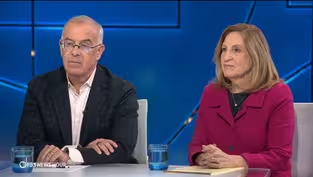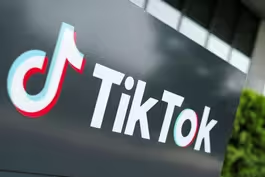
Murder reveals simmering anger with U.S. health care system
Clip: 12/13/2024 | 6m 47sVideo has Closed Captions
CEO murder reveals simmering anger with American health care system
The murder of UnitedHealthcare CEO Brian Thompson has revealed a simmering anger with the American healthcare system in the spotlight. William Brangham discussed more with Wendell Potter. He spent decades working for the health insurance company, Cigna, before leaving and dedicating his career to reform.
Problems playing video? | Closed Captioning Feedback
Problems playing video? | Closed Captioning Feedback
Major corporate funding for the PBS News Hour is provided by BDO, BNSF, Consumer Cellular, American Cruise Lines, and Raymond James. Funding for the PBS NewsHour Weekend is provided by...

Murder reveals simmering anger with U.S. health care system
Clip: 12/13/2024 | 6m 47sVideo has Closed Captions
The murder of UnitedHealthcare CEO Brian Thompson has revealed a simmering anger with the American healthcare system in the spotlight. William Brangham discussed more with Wendell Potter. He spent decades working for the health insurance company, Cigna, before leaving and dedicating his career to reform.
Problems playing video? | Closed Captioning Feedback
How to Watch PBS News Hour
PBS News Hour is available to stream on pbs.org and the free PBS App, available on iPhone, Apple TV, Android TV, Android smartphones, Amazon Fire TV, Amazon Fire Tablet, Roku, Samsung Smart TV, and Vizio.
Providing Support for PBS.org
Learn Moreabout PBS online sponsorshipGEOFF BENNETT: The murder of UnitedHealthcare CEO Brian Thompson has revealed a simmering anger with the American health care system.
William Brangham has more.
WILLIAM BRANGHAM: That's right, Geoff.
Today, in a New York Times op-ed, Andrew Witty, who is the CEO of UnitedHealthcare's parent company, acknowledged people's anger, saying, in part: "We know the health system does not work as well as it should, and we understand people's frustrations with it.
No one would design a system like the one we have."
But, of course, it is the system we have that so many people feel is rigged against them.
For some insight into all of this, we are joined now by Wendell Potter.
He spent decades working for the health insurance company Cigna before leaving and dedicating his career to reforming that industry.
Wendell Potter, so good to have you on the program.
We shouldn't have to stipulate this, but let me do so.
Murdering a health care executive is completely unacceptable.
The online discourse that has followed that murder is ghoulish and ghastly.
But I want to ask you, as someone who spent years working within that industry, what has your reaction been to seeing this cauldron of anger and fury reveal itself?
WENDELL POTTER, President, Center for Health and Democracy: You know, it really hasn't surprised me.
I thought it was just a matter of time before we would see something like this.
It's tragic that the circumstances are as they are, that someone was murdered.
But this has been building for a long time.
And I saw even when I was in the industry I knew that people were -- didn't like us, didn't like the work that we did, and for good reason, because we, as a matter of business, denied necessary care for years and years and years, and also made people pay a lot of money out of their own pockets in recent years before their coverage kicks in.
As a consequence, people are just not getting the care that they need and can afford, despite ever increasing premiums every single year.
And it is a system that these companies didn't create, but I can assure you they spent an enormous amount of money to keep it in place, because it is extraordinarily profitable and very rewarding for the shareholders that own these companies.
WILLIAM BRANGHAM: I mean, there have been some people, including some prominent Democrats, who have said, while they don't condone the shooting violence, they have argued that denial of claims and all of these financial impediments that you're describing that are put on customers is its own kind of violence, a different kind of violence.
What do you think of that?
Is that hyperbole or is there some truth to that?
WENDELL POTTER: There's truth to that.
I have said something comparable.
This was a violent act, but every day across America, and this has been the case for many, many years, I think -- I don't think it's hyperbole to say that these companies have acted with violence toward the people who are enrolled in their health plans, because they have -- through delays and denials, have shortened the lives of a lot of Americans.
They have made a lot of Americans suffer because of these delays.
I talk to patients all the time who've told me about having to try to get the treatments that their doctors know that they need, but they have been delayed for months and months in many cases, and, in many cases, this debilitating pain.
But these companies are able to keep a distance from that.
And, sadly, we're seeing a bubble over into rage that I have never seen before.
WILLIAM BRANGHAM: The suspect in this murder apparently was not a customer of UnitedHealthcare, but it is the nation's largest insurer and apparently has the nation's highest rate of denying claims, I think, ahead of the industry average.
That rate of denials has also been increasing.
Do you have a sense as to why that is?
WENDELL POTTER: The rate of denials has been increasing because of pressure from Wall Street.
It's notable that Brian Thompson was in New York to speak at his company's investor day, which is the most important day in an insurance company's existence if their stock is traded on the New York Stock Exchange, as is UnitedHealth.
So is Cigna's.
I used to plan those days when I was at Cigna, and it is an opportunity for the executives to tell their shareholders how they plan to continue the profitable growth and reward them with the profits that they have been achieving or hopefully - - hope to achieve in the future.
So that's what's most important.
And when you're trying to satisfy Wall Street's profit expectations, actually every three months, that means you have to take some actions that are going to result in people who are enrolling their health plans not getting medically necessary care.
They have one or two ways of controlling health care expenses.
One is to reduce or control the unit cost of goods and services.
Insurers over the years have done a lousy job of doing that.
So they focus on reducing our utilization or making it more difficult for us to get the care that we need.
WILLIAM BRANGHAM: Devil's advocate question, though.
We live in a capitalist society.
These are for-profit companies, as is our entire health care system.
Voters have been presented with single-payer Medicare-for-all options, and it's never taken on a groundswell of support, really.
So how do we go about enacting the change that you and many other advocates argue if we are having to operate in this for-profit system that we're operating in?
WENDELL POTTER: Yes, and one of the reasons why you see an erosion of support for a fairer health care system and one at which the government would play a more significant role in making sure that we're all covered is because these companies spend enormous amounts of money on propaganda campaigns to scare people away from any kind of reforms that the industry doesn't like.
I used to be a part of that.
I have often said that my title should have been vice president of propaganda.
They also spend enormous amounts of money on campaign contributions and lobbying to protect what is a very, very profitable status quo.
Now, it's important you keep in mind, though, that it hasn't been all that many years that we have had these big massive corporations controlling our access to care.
It's only been in more recent years that we have seen these gigantic corporations move into this space.
WILLIAM BRANGHAM: All right, Wendell Potter, health insurance reform advocate, great to speak with you.
Thank you very much.
WENDELL POTTER: Thank you, William.
Amy Sherald on the gaze and humanity of her portraits
Video has Closed Captions
Clip: 12/13/2024 | 6m 48s | Amy Sherald on the gaze and humanity of her portraits (6m 48s)
Brooks and Marcus on what's next for the FBI under Trump
Video has Closed Captions
Clip: 12/13/2024 | 10m 58s | Brooks and Marcus on Wray's resignation and what's next for the FBI (10m 58s)
Former ambassador outlines future role of Syria's neighbors
Video has Closed Captions
Clip: 12/13/2024 | 7m 29s | Former ambassador outlines role Syria's neighbors could play in its future (7m 29s)
Syrians jubilant in first Friday prayers after Assad
Video has Closed Captions
Clip: 12/13/2024 | 5m 36s | Syrians express jubilation during first Friday prayers since overthrow of Assad (5m 36s)
Why an investor thinks TikTok will be safer with U.S. owners
Video has Closed Captions
Clip: 12/13/2024 | 6m 42s | Investor explains why he thinks TikTok will be safer with U.S. ownership (6m 42s)
Providing Support for PBS.org
Learn Moreabout PBS online sponsorship
- News and Public Affairs

FRONTLINE is investigative journalism that questions, explains and changes our world.

- News and Public Affairs

Amanpour and Company features conversations with leaders and decision makers.












Support for PBS provided by:
Major corporate funding for the PBS News Hour is provided by BDO, BNSF, Consumer Cellular, American Cruise Lines, and Raymond James. Funding for the PBS NewsHour Weekend is provided by...




